China Arts & Entertainment
Viral Bilibili Video Featuring Rural Carpenter: Disabled & Determined ‘Uncle’ Becomes Chinese Internet Sensation
Yige Caixiang’s touching portrait of his disabled Uncle shows that it’s not about the cards you’re dealt but about how you play them.
Published
3 years agoon
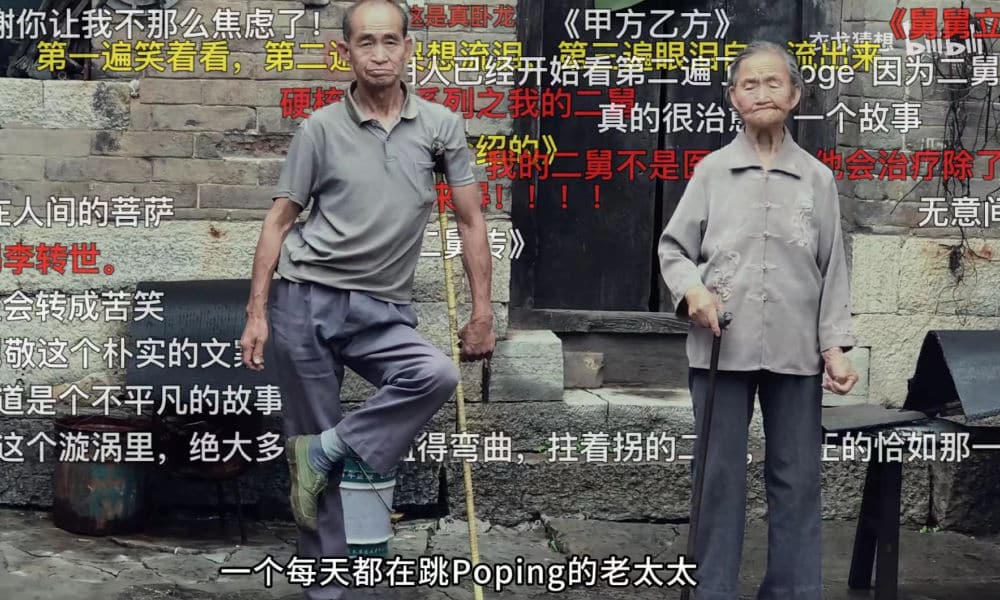
Chinese vlogger Yige Caixiang (衣戈猜想) posted a short film on Bilibili about his disabled uncle living in a poor rural area in China. This portrait of his resilient and resourceful ‘Uncle’ has touched the hearts of many netizens, and went viral overnight.
A video that was posted on the Chinese video platform Bilibili on Monday, July 25, has gone viral on social media for the inspiring story it tells about a resilient villager who became disabled as a teenager. The video was uploaded by vlogger ‘Yige Caixiang’ (@衣戈猜想) and received over ten million views in a day, becoming the number one video on the Bilibili platform.
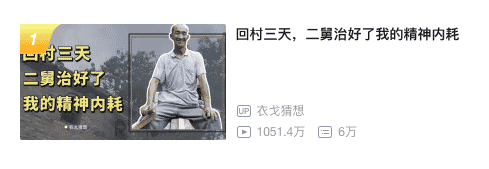
“This is my uncle,” the vlogger can be heard saying at the start of the 11:30-minute video, titled “How Uncle Cured My Mental Friction after Being Back in the Village for Three Days” (回村三天,二舅治好了我的精神内耗), introducing his old uncle and grandma standing in front of their home “built at a time when the U.S. didn’t even exist yet.”
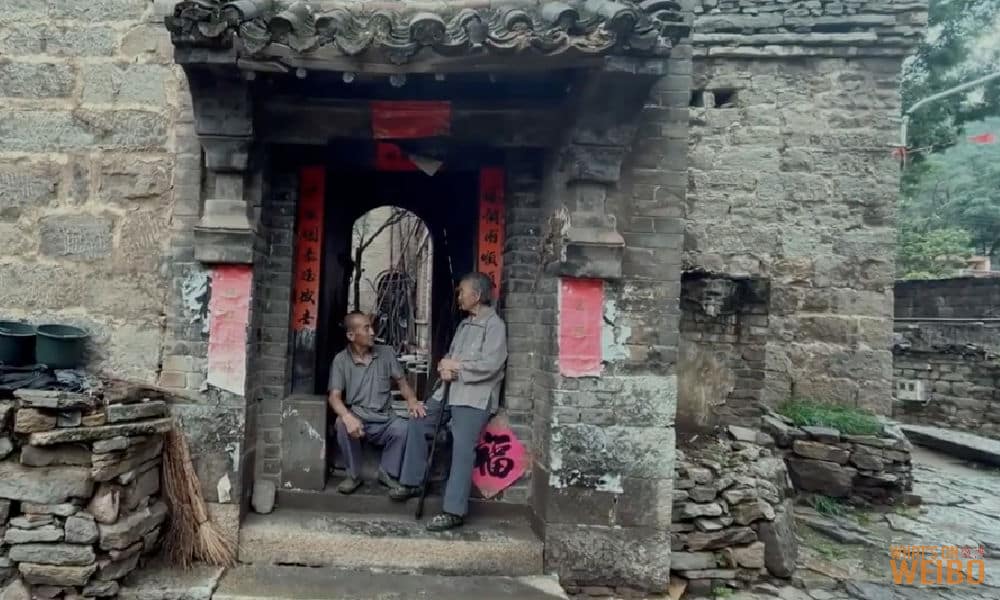
While showing footage of family and village life, Yige Caixiang tells about his uncle through a voice-over, recording his own trip to his family’s village by detailing the life of his mother’s brother.
His uncle used to be the brightest kid in school, he tells, always getting top grades. One day, as a teenager, he got sick with a high fever. A doctor in a neighboring village ‘treated’ Uncle with various injections in his backside, after which Uncle could no longer use his leg and ended up being permanently disabled. Feeling depressed and hopeless, he did not return to school and spent weeks lying in bed. The village teachers were unable to convince him to come back to class.
After three years, Uncle stepped outside of the home courtyard for the first time with his crutches. He was inspired to become a carpenter after seeing one at work in the family courtyard, and so he also started doing the same work, and was able to make a living by going around and doing carpentry jobs for villagers. Never formally diagnosed, he was unable to get a disability certificate.
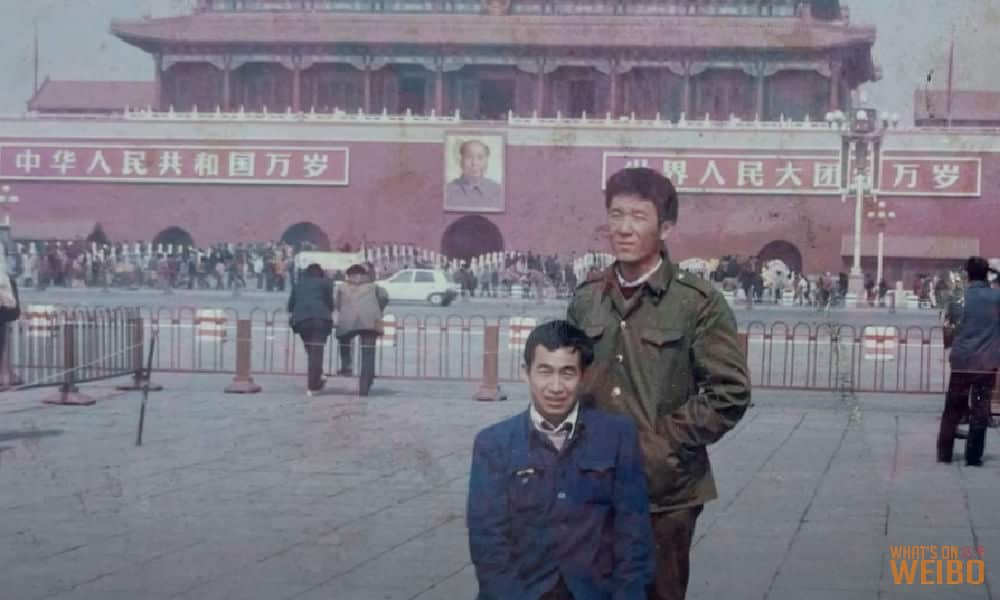
Wanting to visit Tiananmen Square’s Mao memorial hall, Uncle traveled to Beijing one time and ended up staying with a cousin who worked in the military, doing carpentry work for the soldiers, with whom he soon became friends. A military chief even rubbed his back in the public bath house (“people in Beijing are good at rubbing backs,” he’d later say).
But Uncle eventually returned to his village, and was able to attend his sisters’ wedding send-offs and gave them complete furniture sets personally made by him – a rare possession to have for a young rural bride in the 1980s.
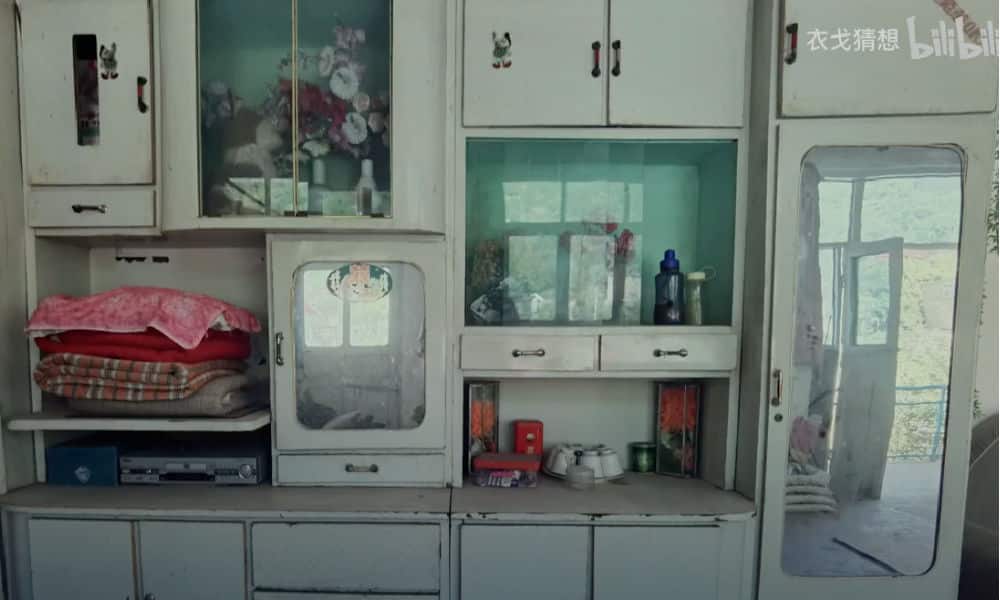
Uncle made complete furniture sets.
Besides taking care of his sisters, Uncle also took care of an abandoned village girl named Ning Ning, whom he adopted. By the time she got married, he was able to help the young couple with the down-payment for their new family home, for which he invested half of his life savings.
“It is only when they are near the end of their lives that people come to realize that the biggest regret in life is always regretting the past.”
When Uncle was in his thirties, he became acquainted with a married lady from a nearby village. Although she had a husband and two daughters, she spent a lot of time with Uncle and even cooked and cleaned for him. Treating her as if she was his own wife, he handed over his weekly pay to her and was happy to have a bowl of rice and a warm house waiting for him after a hard day of work.
But as time went on, she never divorced her husband and other family members started seeing her as an intruder who was just out for his money to support her own family. The young Ning Ning even called her an “old fox.”
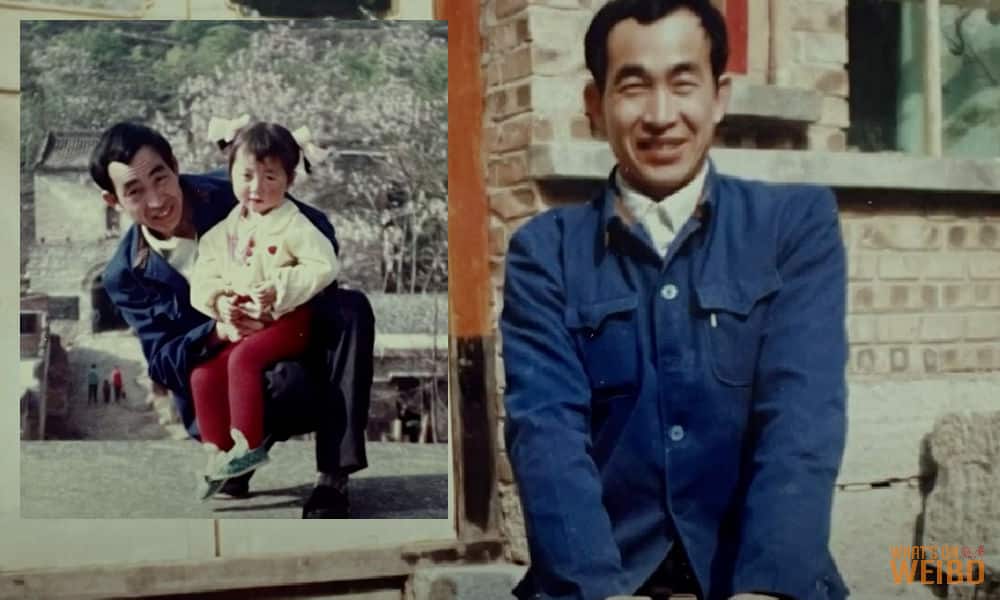
The ending of this peculiar love story remains somewhat of a mystery up to this day, Yige Caixiang says. The woman and her husband passed away in a shed due to carbon monoxide poisoning. Uncle never spoke of it again and also never married another woman.
As the decades passed, Uncle took care of his aging mother while still doing carpentry work, often taking him with her around the area. Years before, he once encountered the doctor who tried to ‘cure’ him. If this had happened now, the doctor had said, I would’ve been sued and lost lots of money. But that never would have happened at that time, and it never happened later either.
Grandmother, at 88, is now struggling with her health and does not have the energy to go on living anymore. “In aging and sickness we find a necessary exercise between life and death,” the vlogger reflects (“老病是生死之间的必要演习”), suggesting that the pain of growing old also makes it easier to be at peace when having to part with life.
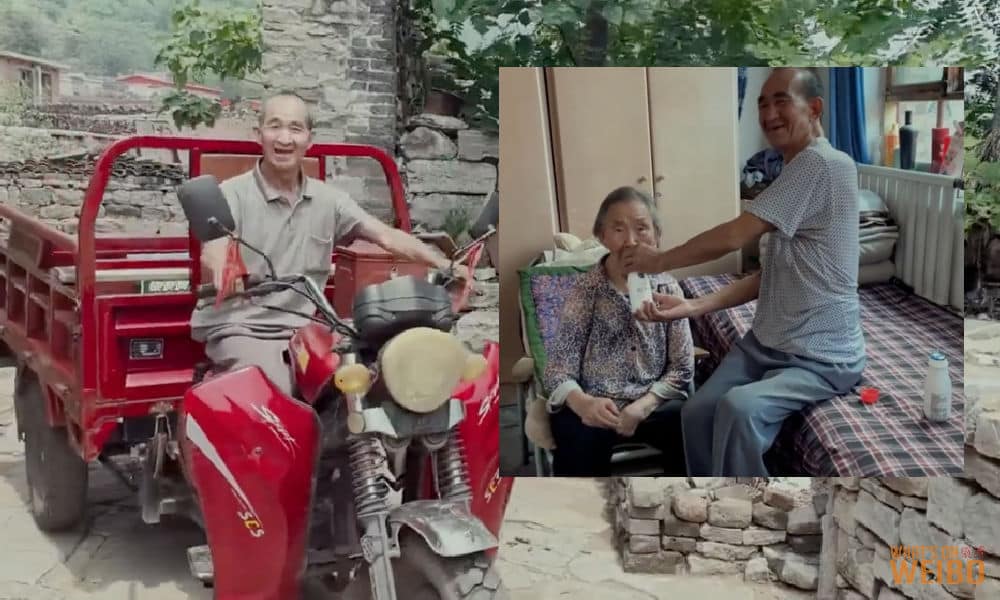
By now, taking care of his old mother has become a full-time job for Uncle, who cooks for her and washes her face in the morning and bathes her feet at night. Besides that, he is also more than just a carpenter; he is the village handyman, repairing electronic devices, door locks, radios, stoves, and even fixing broken toys of the neighborhood children. When it is necessary, he can be an acupuncturist and a painter, too.
Whenever there is a problem, Uncle will find a way to solve it. There’s just three things he can’t repair, Yige Caixang says: smartphones, cars, and computers – because Uncle never owned any. Although the villagers sometimes jokingly call Uncle “crooked” because of his leg and crutches, they all know how much they care for him and how much the entire village depends on him.
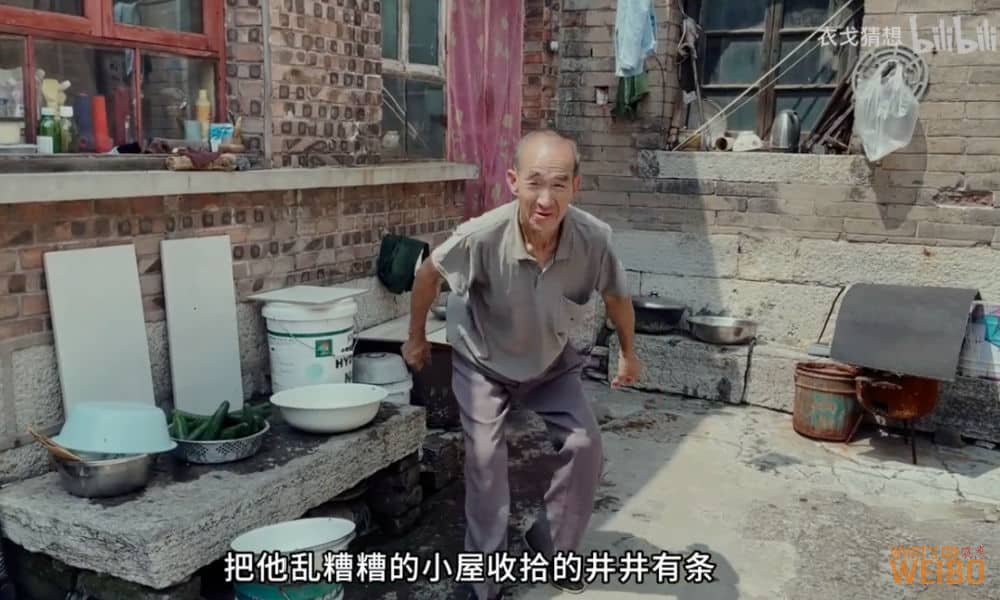
In the final part of the 11-minute video, Yige Caixiang reflects on what life might have looked like for his Uncle if he had not received those injections in the 1970s. He probably would have taken the national exams, would have gone to study at university, and maybe would have become an engineer with a good income and secure financial future. But Uncle does not want to think like that. Refusing to look back, he is happy with his life in the village.
It is only when they are near the end of their lives that people come to realize that the biggest regret in life is always regretting the past, Yige Caixiang says. The main thing that matters in life is not the cards you were dealt, but how you play them. Uncle was dealt a bad card, but played it beautifully through his continuous self-improvement and perseverance.
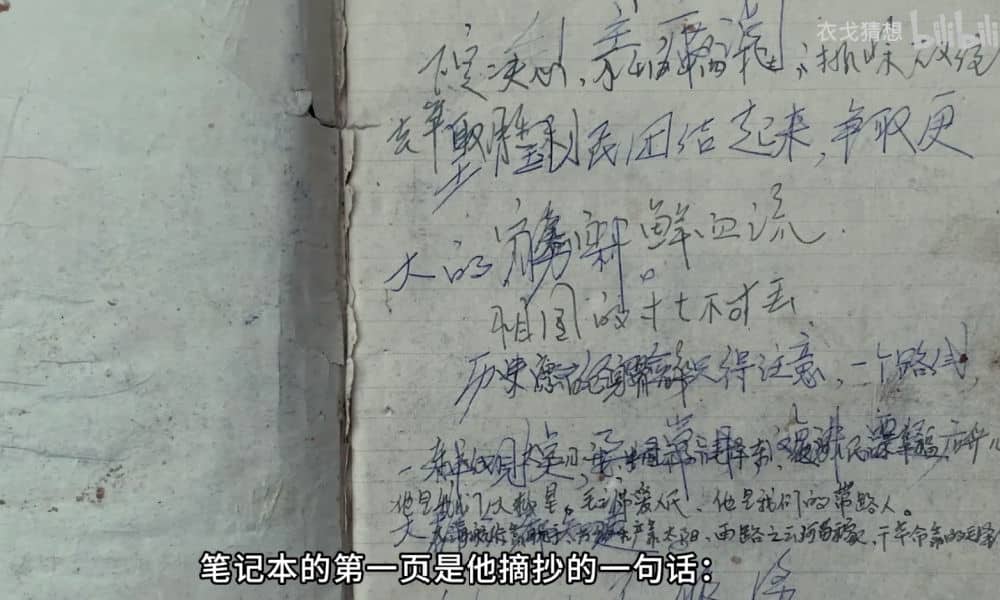
In an old notebook underneath Uncle’s bed, a line of text scribbled on the first page shows a Mao Zedong quote: “Be determined, fear no sacrifice, and surmount every difficulty to win victory” (“下定决心,不怕牺牲,排除万难,去争取胜利”).
“Let Uncle quietly live together with grandma in the small mountain village – that is the most beautiful ending this story could have.”
A day after it was posted, the resilient Uncle is a much-discussed topic on Chinese social media. The overall tone and setting of the video is so spirit-lifting and humbling, that it is not surprising for both netizens and state media outlets to jump on it, just as they did before with stories shared by Ding Zhen, Fan Yusu, or Zhong Jitao.
One hashtag for the short film – “How Uncle Cured My Mental Friction after Being Back in the Village for Three Days” #二舅治好了我的精神内耗# – received a staggering 630 million clicks by Tuesday. The hashtag “Why Did Uncle Blow Up Like That” (#二舅为什么突然火了#) received over 140 million views on Weibo.
The vlogger who made and posted the video is mostly known by his social media handle, Yige Caixiang (衣戈猜想). The maker himself did not release his own real name nor that of his Uncle. The vlogger apparently used to be an instructor, as multiple netizens claim that he was their previous history teacher.
Yige Caixiang is not a Bilibili newcomer. As a creator, he previously uploaded over thirty videos. They are mostly related to popular science and none of them have blown up like this one has.
After the video flooded the internet, Yige Caixiang responded to the hype on Tuesday and posted the following on Weibo:
“Hi Weibo friends, many of you messaged me after seeing Uncle’s video, suggesting I’d let him go livestream on a big streaming site. Thanks to everyone for caring, but now that Uncle is getting some online attention, you want to persuade him to livestream to do what? Repeating his suffering like Xianglin’s Wife (t/n: this is a reference to an old woman in one of Lu Xun’s famous stories), then playing games with a bunch of people who don’t know anything, kneeling and begging them for support, and then suddenly starting to talk them into buying tissue paper? Uncle seriously lived half of his life already, I shared his story now, you heard it and it touched you, this makes a beautiful little story, and it should have a beautiful ending. Didn’t we see enough beautiful stories with a rotten ending over the past few years? Let Uncle quietly live together with grandma in the small mountain village – that is the most beautiful ending this story could have.”
Addressing rumors that the video was not authentic, Yige Caixiang said about the video that “every single word is true” and that none of the details surrounding Uncle’s life had been edited or altered in any way.
The video speaks to netizens for different reasons. Many are inspired due to the life lessons it contains regarding perseverance and not looking back on the things that might have been different. Others praise how Uncle was still able to save so much money for his daughter’s down-payment on her new home despite struggling himself. Many just applaud Uncle’s unparalleled strength despite their disability. Others appreciate the perspective the video gives on Chinese rural life.
There are also those who are concerned about enthusiastic netizens visiting Uncle in his sleepy hometown. Let’s hope the creator’s wish to let Uncle and his grandmother continue their quiet life together is the happy ending this viral story will get.
To view the video (no subtitles yet), state media outlet China Daily posted it to YouTube on Tuesday (embedded below):
By Manya Koetse
With contributions by Miranda Barnes
Get the story behind the hashtag. Subscribe to What’s on Weibo here to receive our weekly newsletter and get access to our latest articles:
Spotted a mistake or want to add something? Please let us know in comments below or email us. First-time commenters, please be patient – we will have to manually approve your comment before it appears.
©2022 Whatsonweibo. All rights reserved. Do not reproduce our content without permission – you can contact us at info@whatsonweibo.com.
Manya is the founder and editor-in-chief of What's on Weibo, offering independent analysis of social trends, online media, and digital culture in China for over a decade. Subscribe to gain access to content, including the Weibo Watch newsletter, which provides deeper insights into the China trends that matter. More about Manya at manyakoetse.com or follow on X.

China Arts & Entertainment
How K-pop Fans and the 13-Year-Old Daughter of Baidu VP Sparked a Debate on Online Privacy
What began as K-pop fan outrage targeting a snarky commenter quickly escalated into a Baidu-linked scandal and a broader conversation about data privacy on Chinese social media.
Published
2 weeks agoon
March 26, 2025By
Ruixin Zhang
For an ordinary person with just a few followers, a Weibo account can sometimes be like a refuge from real life—almost like a private space on a public platform—where, along with millions of others, they can express dissatisfaction about daily annoyances or vent frustration about personal life situations.
But over recent years, even the most ordinary social media users could become victims of “opening the box” (开盒 kāihé)—the Chinese internet term for doxxing, meaning the deliberate leaking of personal information to expose or harass someone online.
A K-pop Fan-Led Online Witch Hunt
On March 12, a Chinese social media account focusing on K-pop content, Yuanqi Taopu Xuanshou (@元气桃浦选手), posted about Jang Wonyoung, a popular member of the Korean girl group IVE. As the South Korean singer and model attended Paris Fashion Week and then flew back the same day, the account suggested she was on a “crazy schedule.”
In the comment section, one female Weibo user nicknamed “Charihe” replied:
💬 “It’s a 12-hour flight and it’s not like she’s flying the plane herself. Isn’t sleeping in business class considered resting? Who says she can’t rest? What are you actually talking about by calling this a ‘crazy schedule’..”

Although the comment may have come across as a bit snarky, it was generally lighthearted and harmless. Yet unexpectedly, it brought disaster upon her.
That very evening, the woman nicknamed Charihe was bombarded with direct messages filled with insults from fans of Jang Wonyoung and IVE.
Ironically, Charihe’s profile showed she was anything but a hater of the pop star—her Weibo page included multiple posts praising Wonyoung’s beauty and charm. But that context was ignored by overzealous fans, who combed through her social media accounts looking for other posts to criticize, framing her as a terrible person.
After discovering through Charihe’s account that she was pregnant, Jang Wonyoung’s fans escalated their attacks by targeting her unborn child with insults.
The harassment did not stop there. Around midnight, fans doxxed Charihe, exposing her personal information, workplace, and the contact details of her family and friends. Her friends were flooded with messages, and some were even targeted at their workplaces.
Then, they tracked down Charihe’s husband’s WeChat account, sent him screenshots of her posts, and encouraged him to “physically punish” her.
The extremity of the online harassment finally drew backlash from netizens, who expressed concern for this ordinary pregnant woman’s situation:
💬 “Her entire life was exposed to people she never wanted to know about.”
💬 “Suffering this kind of attack during pregnancy is truly an undeserved disaster.”
Despite condemnation of the hate, some extreme self-proclaimed “fans” remained relentless in the online witch hunt against Charihe.
Baidu Takes a Hit After VP’s 13-Year-Old Daughter Is Exposed
One female fan, nicknamed “YourEyes” (@你的眼眸是世界上最小的湖泊), soon started doxxing commenters who had defended her. The speed and efficiency of these attacks left many stunned at just how easy it apparently is to trace social media users and doxx them.
Digging into old Weibo posts from the “YourEyes” account, people found she had repeatedly doxxed people on social media since last year, using various alt accounts.
She had previously also shared information claiming to study in Canada and boasted about her father’s monthly salary of 220,000 RMB (approx. $30.3K), along with a photo of a confirmation document.
Piecing together the clues, online sleuths finally identified her as the daughter of Xie Guangjun (谢广军), Vice President of Baidu.
From an online hate campaign against an innocent, snarky commenter, the case then became a headline in Chinese state media, and even made international headlines, after it was confirmed that the user “YourEyes”—who had been so quick to dig up others’ personal details—was in fact the 13-year-old daughter of Xie Guangjun, vice president at one of China’s biggest tech giants.
On March 17, Xie Guangjun posted the following apology to his WeChat Moments:

💬 “Recently, my 13-year-old daughter got into an online dispute. Losing control of her emotions, she published other people’s private information from overseas social platforms onto her own account. This led to her own personal information also getting exposed, triggering widespread negative discussion.
As her father, I failed to detect the problem in time and failed to guide her in how to properly handle the situation. I did not teach her the importance of respecting and protecting the privacy of others and of herself, for which I feel deep regret.
In response to this incident, I have communicated with my daughter and sternly criticized her actions. I hereby sincerely apologize to all friends affected.
As a minor, my daughter’s emotional and cognitive maturity is still developing. In a moment of impulsiveness, she made a wrong decision that hurt others and, at the same time, found herself caught in a storm of controversy that has subjected her to pressure and distress far beyond her age.
Here, I respectfully ask everyone to stop spreading related content and to give her the opportunity to correct her mistakes and grow.
Once again, I extend my apologies, and I sincerely thank everyone for your understanding and kindness.”
The public response to Xie’s apology has been largely negative. Many criticized the fact that it was posted privately on WeChat Moments rather than shared on a public platform like Weibo. Some dismissed the statement as an attempt to pacify Baidu shareholders and colleagues rather than take real accountability.
Netizens also pointed out that the apology avoided addressing the core issue of doxxing. Concerns were raised about whether Xie’s position at Baidu—and potential access to sensitive information—may have helped his daughter acquire the data she used to doxx others.
Adding fuel to the speculation were past conversations allegedly involving one of @YourEyes’ alt accounts. In one exchange, when asked “Who are you doxxing next?” she replied, “My parents provided the info,” with a friend adding, “The Baidu database can doxx your entire family.”
Following an internal investigation, Baidu’s head of security, Chen Yang (陈洋), stated on the company’s internal forum that Xie Guangjun’s daughter did not obtain data from Baidu but from “overseas sources.”
However, this clarification did little to reassure the public—and Baidu’s reputation has taken a hit. The company has faced prior scandals, most notably a the 2016 controversy over profiting from misleading medical advertisements.
Online Vulnerability
Beyond Baidu’s involvement, the incident reignited wider concerns about online privacy in China. “Even if it didn’t come from Baidu,” one user wrote, “the fact that a 13-year-old can access such personal information about strangers is terrifying.”
Using the hashtag “Reporter buys own confidential data” (#记者买到了自己的秘密#), Chinese media outlet Southern Metropolis Daily (@南方都市报) recently reported that China’s gray market for personal data has grown significantly. For just 300 RMB ($41), their journalist was able to purchase their own household registration data.
Further investigation uncovered underground networks that claim to cooperate with police, offering a “70-30 profit split” on data transactions.
These illegal data practices are not just connected to doxxing but also to widespread online fraud.
In response, some netizens have begun sharing guides on how to protect oneself from doxxing. For example, they recommend people disable phone number search on apps like WeChat and Alipay, hide their real name in settings, and avoid adding strangers, especially if they are active in fan communities.
Amid the chaos, K-pop fan wars continue to rage online. But some voices—such as influencer Jingzai (@一个特别虚荣的人)—have pointed out that the real issue isn’t fandom, but the deeper problem of data security.
💬 “You should question Baidu, question the telecom giants, question the government, and only then, fight over which fan group started this.”
As for ‘Charihe,’ whose comment sparked it all—her account is now gone. Her username has become a hashtag. For some, it’s still a target for online abuse. For others, it is a reminder of just how vulnerable every user is in a world where digital privacy is far from guaranteed.
By Ruixin Zhang
Independently covering digital China for over a decade. Like what we do? Support us and get the story behind the hashtag by subscribing:
edited for clarity by Manya Koetse
Spotted a mistake or want to add something? Please let us know in comments below or email us. First-time commenters, please be patient – we will have to manually approve your comment before it appears.
©2024 Whatsonweibo. All rights reserved. Do not reproduce our content without permission – you can contact us at info@whatsonweibo.com.
China Memes & Viral
How Ne Zha 2’s Shen Gongbao Became Known as the Ultimate “Small-Town Swot”
Published
1 month agoon
March 1, 2025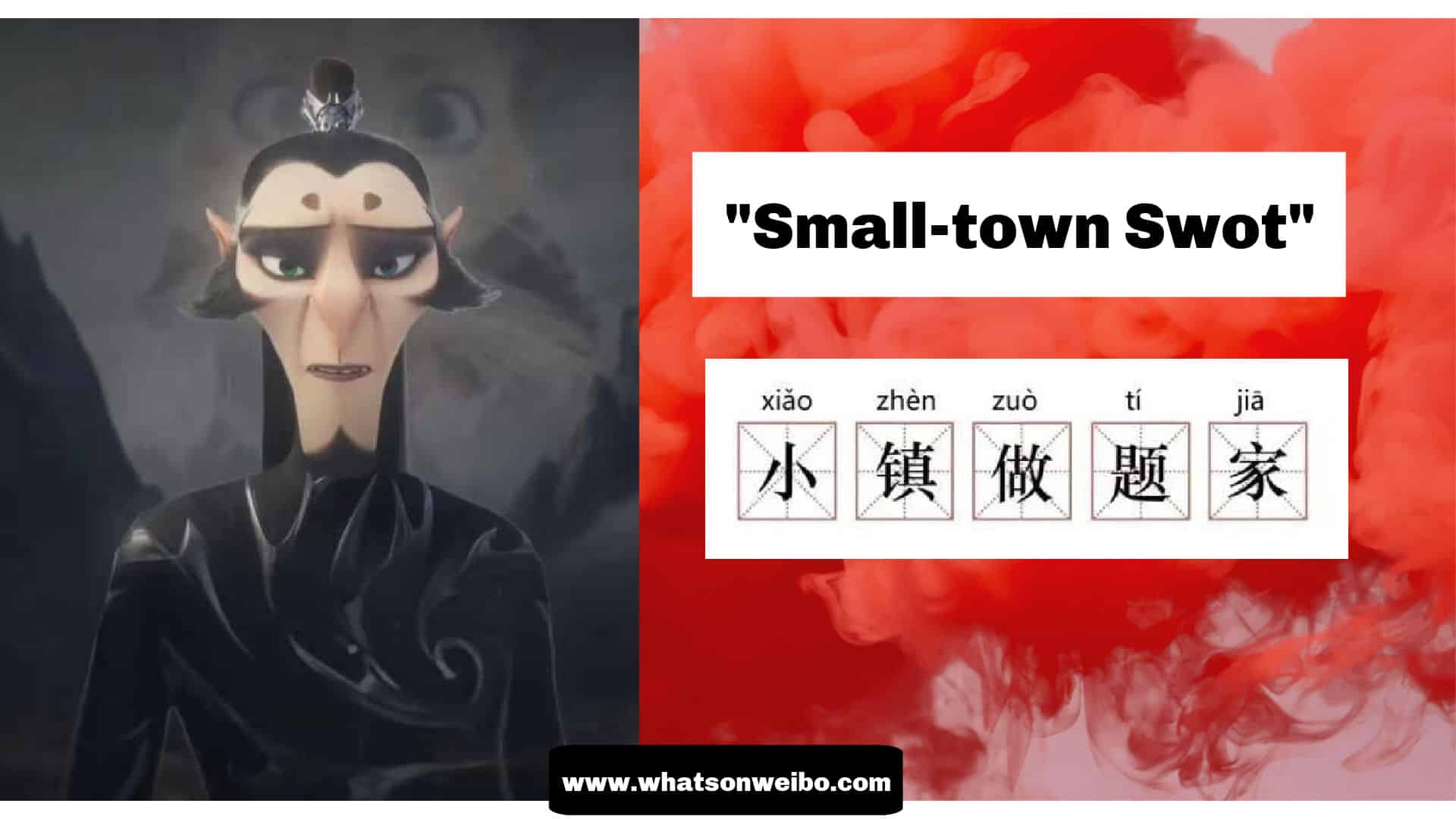
PART OF THIS TEXT COMES FROM THE WEIBO WATCH PREMIUM NEWSLETTER
Over the past few weeks, the Chinese blockbuster Ne Zha 2 has been trending on Weibo every single day. The movie, loosely based on Chinese mythology and the Chinese canonical novel Investiture of the Gods (封神演义), has triggered all kinds of memes and discussions on Chinese social media (read more here and here).
One of the most beloved characters is the leopard demon Shen Gongbao (申公豹). While Shen Gongbao was a more typical villain in the first film, the narrative of Ne Zha 2 adds more nuance and complexity to his character. By exploring his struggles, the film makes him more relatable and sympathetic.
In the movie, Shen is portrayed as a sometimes sinister and tragic villain with humorous and likeable traits. He has a stutter, and a deep desire to earn recognition. Unlike many celestial figures in the film, Shen Gongbao was not born into privilege and never became immortal. As a demon who ascended to the divine court, he remains at the lower rungs of the hierarchy in Chinese mythology. He is a hardworking overachiever who perhaps turned into a villain due to being treated unfairly.
Many viewers resonate with him because, despite his diligence, he will never be like the gods and immortals around him. Many Chinese netizens suggest that Shen Gongbao represents the experience of many “small-town swots” (xiǎozhèn zuòtíjiā 小镇做题家) in China.
“Small-town swot” is a buzzword that has appeared on Chinese social media over the past few years. According to Baike, it first popped up on a Douban forum dedicated to discussing the struggles of students from China’s top universities. Although the term has been part of social media language since 2020, it has recently come back into the spotlight due to Shen Gongbao.
“Small-town swot” refers to students from rural areas and small towns in China who put in immense effort to secure a place at a top university and move to bigger cities. While they may excel academically, even ranking as top scorers, they often find they lack the same social advantages, connections, and networking opportunities as their urban peers.
The idea that they remain at a disadvantage despite working so hard leads to frustration and anxiety—it seems they will never truly escape their background. In a way, it reflects a deeper aspect of China’s rural-urban divide.
Some people on Weibo, like Chinese documentary director and blogger Bianren Guowei (@汴人郭威), try to translate Shen Gongbao’s legendary narrative to a modern Chinese immigrant situation, and imagine that in today’s China, he’d be the guy who trusts in his hard work and intelligence to get into a prestigious school, pass the TOEFL, obtain a green card, and then work in Silicon Valley or on Wall Street. Meanwhile, as a filial son and good brother, he’d save up his “celestial pills” (US dollars) to send home to his family.
Another popular blogger (@痴史) wrote:
“I just finished watching Ne Zha and my wife asked me, why do so many people sympathize with Shen Gongbao? I said, I’ll give you an example to make you understand. Shen Gongbao spent years painstakingly accumulating just six immortal pills (xiāndān 仙丹), while the celestial beings could have 9,000 in their hand just like that.
It’s like saving up money from scatch for years just to buy a gold bracelet, only to realize that the trash bins of the rich people are made of gold, and even the wires in their homes are made of gold. It’s like working tirelessly for years to save up 60,000 yuan ($8230), while someone else can effortlessly pull out 90 million ($12.3 million).In the Heavenly Palace, a single meal costs more than an ordinary person’s lifetime earnings.
Shen Gongbao seems to be his father’s pride, he’s a role model to his little brother, and he’s the hope of his entire village. Yet, despite all his diligence and effort, in the celestial realm, he’s nothing more than a marginal figure. Shen Gongbao is not a villain, he is just the epitome of all of us ordinary people. It is because he represents the state of most of us normal people, that he receives so much empathy.”
In the end, in the eyes of many, Shen Gongbao is the ultimate small-town swot. As a result, he has temporarily become China’s most beloved villain.
By Manya Koetse, with contributions by Wendy Huang
Follow @whatsonweibo
Spotted a mistake or want to add something? Please let us know in comments below or email us. Please note that your comment below will need to be manually approved if you’re a first-time poster here.
©2025 Whatsonweibo. All rights reserved. Do not reproduce our content without permission – you can contact us at info@whatsonweibo.com
Subscribe

No Quiet Qingming: From High-Tech Tomb-Sweeping to IShowSpeed & the Seven China Streams

From Trade Crisis to Patriotic Push: Chinese Online Reactions to Trump’s Tariffs

China Trending Week 14: Gucci Fake Lipstick, Xiaomi SU7 Crash, Yoon’s Impeachment

Strange Encounter During IShowSpeed’s Chengdu Livestream

IShowSpeed in China: Streaming China’s Stories Well

Our Picks: Top 10 Chinese Buzzwords and Phrases of 2024 Explained

“Dear Li Hua”: The TikTok/Xiaohongshu Honeymoon Explained

Beyond the Box Office: What’s Behind Ne Zha 2’s Success?

Weibo Watch: A New Chapter

15 Years of Weibo: The Evolution of China’s Social Media Giant

Tuning Into the Year of the Snake

IShowSpeed in China: Streaming China’s Stories Well

TikTok Refugees, Xiaohongshu, and the Letters from Li Hua

The ‘China-chic Girl’ Image and the Realities of China’s Competitive Food Delivery Market

“Black Myth: Wukong”: From Gaming Screens to the CMG Spring Festival Gala?
Get in touch
Would you like to become a contributor, or do you have any tips or suggestions? Get in touch here!
Popular Reads
-

 China Insight11 months ago
China Insight11 months agoThe Tragic Story of “Fat Cat”: How a Chinese Gamer’s Suicide Went Viral
-

 China Digital10 months ago
China Digital10 months agoChina’s 2024 Gaokao Triggers Online Discussions on AI
-

 China Arts & Entertainment11 months ago
China Arts & Entertainment11 months agoSinging Competition or Patriotic Fight? Hunan TV’s ‘Singer 2024’ Stirs Nationalistic Sentiments
-

 China Arts & Entertainment12 months ago
China Arts & Entertainment12 months ago“Old Bull Eating Young Grass”: 86-Year-Old Chinese Painter Fan Zeng Marries 36-Year-Old Xu Meng






